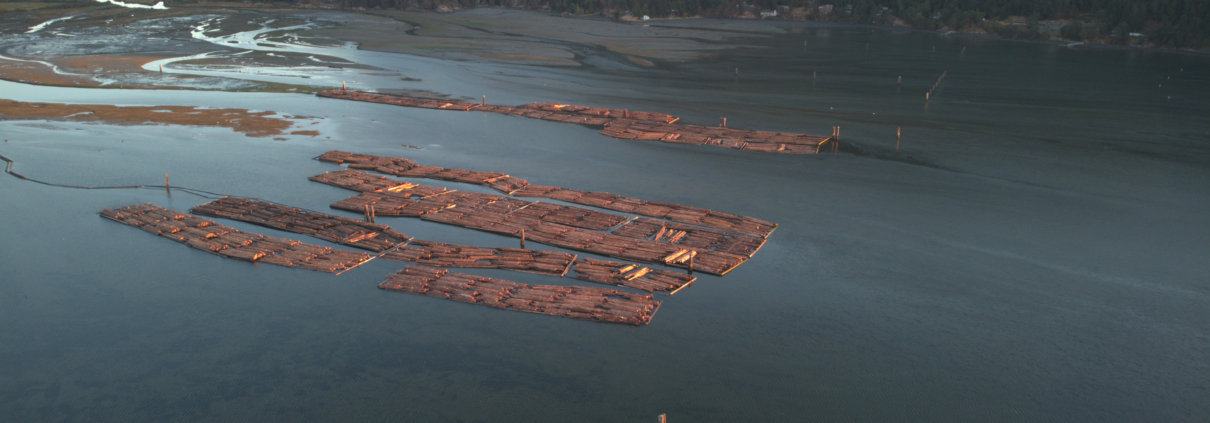New Report Highlights Devastating Impact of Log Boom Operations in Cowichan Estuary
June 11, 2024
Cowichan Tribes, BC Conservation Foundation, and Pacific Salmon Foundation year six study results demonstrate need for more to be done to save salmon populations.
DUNCAN, B.C. – Today, Cowichan Tribes, in collaboration with the BC Conservation Foundation (BCCF) and the Pacific Salmon Foundation (PSF), released a Year Six Report, outlining the detrimental impacts of log boom storage on wild Pacific salmon populations in the Cowichan-Koksilah Estuary. The report, part of a joint eight-year study, emphasizes the need for best practices to be implemented to support the survival and recovery of Chinook salmon and estuary ecosystems.
More than 100 years of log boom handling operations in the Cowichan-Koksilah Estuary have littered the sea bed with anoxic zones of cut logs, bark, and sticks, causing widespread damage to salmon-dependent eelgrass beds and forage fish populations. This multi-year study clearly indicates that the booms’ current positioning in crucial salmon migration corridors facilitates seal predation, which is one of the key factors in the correlation between declining Pacific salmon populations and burgeoning harbour seal density.
“Stseelhtun (salmon) are an integral part of our spiritual and cultural identity and they have been hit hard by the loss of marsh habitat, climate change, logging, and log boom operations in our territory,” said Cowichan Tribes Chief Cindy Daniels (Sulsulxumaat). “I commend our Luxumexun (Lands and Self Governance) department, BC Conservation Foundation and Pacific Salmon Foundation for their long-term commitment to this study which has delivered concrete data demonstrating the level of crisis our relatives, the salmon, are experiencing. With these results, we look forward to working with government, industry, and partners to take actions to reverse these impacts before it is too late,” added Daniels.
Results from the study indicate that the presence of log booms has a statistically significant negative impact on adult Chinook terminal survival. The mechanism is altering predator-prey dynamics between harbour seals and salmon by enhancing predation efficiency. Further, this impact is exacerbated by low flows, preventing adult Chinook from migrating into the river and away from predation pressures in the lower river and estuary. As climate impacts become more severe, the negative impacts of log booms in key migration corridors and low river flows will increase.
Based on the study results, BCCF has developed a series of best management practices specific to the Cowichan-Koksilah Estuary designed to limit, restrict, and offset damage to fish and fish habitat. Such listed strategies include: situating the booms in deeper water where ocean-going ships already anchor and onshore log limbing and cleaning practices.
“Indigenous knowledge and Western science both indicate that the current log booming operations in the Cowichan-Koksilah Estuary are degrading the estuarine environment physically, chemically, biologically, and ecologically,” said Jamieson Atkinson, Program Manager, Aquatic Research and Restoration Centre, BC Conservation Foundation. “With climate forecasts calling for increasing drought periods, this study’s findings highlight the urgent need for effective management strategies to ensure the survival and recovery of wild Pacific salmon stocks.”
“Pacific salmon need us to take actions within our control to support their recovery. This study, led by Cowichan Tribes and BC Conservation Foundation, presents us with a clear path forward to collaborate with industry and crown government to update log boom storage practices. The recommendations set out in this report will have immediate and long-term benefits for recovery and resilience of Pacific salmon who depend on healthy estuaries during their migration,” says Michael Meneer, President and CEO, Pacific Salmon Foundation.
Additional Information:
–Year 6 Report: Understanding the impact of Anthropogenic and Environmental Conditions on Adult Chinook Salmon
–Technical Backgrounder
Media Contacts:
Tara Zwaan, Communications Manager
Cowichan Tribes
(250)732-7502 | Public.Relations@cowichantribes.com
Jamieson Atkinson, R.P. Bio, Program Manager, ARRC
BC Conservation Foundation
(250)390-2525, ext. 103 | jatkinson@bccf.com
Oscar Beardmore-Gray, Communications Coordinator
Pacific Salmon Foundation
(778)522-4413 | obeardmore-gray@psf.ca
This research was led by Cowichan Tribes and BC Conservation Foundation. The Pacific Salmon Foundation is a non-profit environmental organization dedicated to the conservation and restoration of wild Pacific salmon and their habitats in B.C. and the Yukon. Our motto is: is salmon first, salmon always, and working with Indigenous partners, thousands of stream keepers, government, academic institutions and a coalition of people for salmon, we never go it alone.



